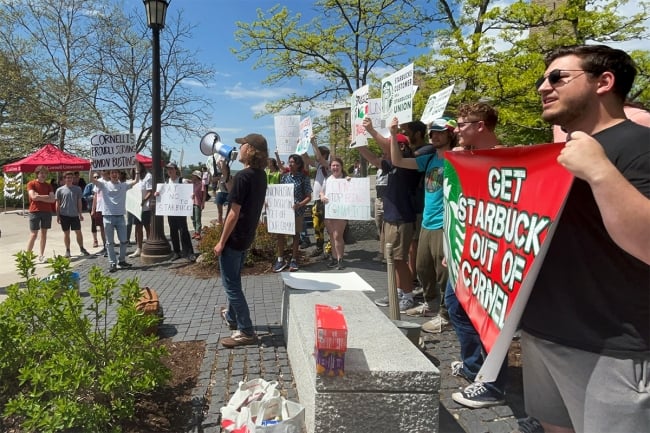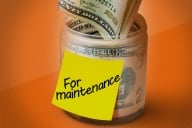You have /5 articles left.
Sign up for a free account or log in.

Cornell students protested the campus’s partnership with Starbucks in May.
Danielle Donovan
Generation Z isn’t happy with Starbucks’ labor practices, and some college students are showing their displeasure by doing more than just skipping their morning cold brew—they’re actively trying to get Starbucks-branded cafes removed from their campuses.
Student activists at more than 50 universities across the country are pushing administrators to end contracts with the Seattle-based coffee chain in protest of the company’s response to employee unionization. Starbucks workers began organizing in late 2021 in the hopes of receiving higher wages, better benefits and more security for those benefits. Since then, the National Labor Relations Board has accused Starbucks of hundreds of labor-rights violations, including firing pro-union employees and shutting down unionized locations. Starbucks, once known for its progressive politics and above-average benefits, has denied store closures or firings had anything to do with unionization efforts.
One group of activists has already succeeded in their mission: students at Cornell University received official word from President Martha E. Pollack in August that the Ivy League institution will not renew its contract with Starbucks when it comes up in 2025.
The activists, many of whom are or once were Starbucks baristas themselves, first launched a campaign supporting that goal in May. The campaign included giving out coffee in front of a campus Starbucks to raise awareness for the cause—and solicit donations to support striking baristas at other Starbucks locations in town—and holding a two-day sit-in at Day Hall, Cornell’s administrative building. Cornell’s Student Assembly also passed a resolution asking the institution to cut ties with the coffee giant.
The issue was particularly close to the hearts of the Cornell community, according to Nick Wilson, a student and former Starbucks worker: Ithaca, N.Y., where the university is located, was the first town in America in which every Starbucks store unionized—except the one on campus. (In on-campus Starbucks cafes, employees typically work for the university, not for Starbucks itself.)
The company subsequently shut down the three other Ithaca locations, though the NLRB has ordered it to reopen one and reinstate its workers. Starbucks appealed that ruling, and the legal battle over all three stores is ongoing.
Student Danielle Donovan said Cornell administrators didn’t initially seem aware of Starbucks’s labor practices, even though the store closures impacted about 20 students who worked at the off-campus locations.
“But they did keep their promise of a meeting [with activists] and doing their research on what happened,” she said.
Ultimately, she believes that once administrators learned of Starbucks’s alleged antiunion retaliation, they grew to understand the activists’ position.
“I greatly appreciate the [Student Assembly’s] concerns and perspective regarding Cornell’s relationship with Starbucks Coffee Company,” Pollack wrote in May in response to the student government’s resolution. “Cornell supports fair labor practices in compliance with federal and New York State law, and our School of Industrial and Labor Relations is the preeminent educational institution in the world focused on improving the lives of workers.”
She went on to say the university would begin reviewing its contract with Starbucks and considering new vendors by fall 2024—almost a full year before the contract is scheduled to expire. The official announcement that the contract would not be renewed came in August.
In an emailed statement to Inside Higher Ed, Starbucks denied activists’ characterization of the company as vehemently antiunion.
“Despite mischaracterizations by Workers United and their absence at more than 300 bargaining tables, Starbucks has progressed negotiations with unions that prioritize those they represent,” a spokesperson wrote.
Hometown Blues
Student organizers at more than 50 campuses hope to follow in Cornell’s footsteps, Donovan told Inside Higher Ed. They include the University of Washington, whose flagship campus is located in Starbucks’s hometown of Seattle. Leading the charge there is Sofia Torres, a UW student who worked as a barista in high school. Torres recalled that the store she served in was chronically understaffed and undersupplied, causing managers to run employees ragged and fault them for circumstances outside their control, such as running out of products.
“There was this idea that we weren’t able to fulfill our jobs because of us as employees rather than the lack of resources that we were given,” she said.
Those experiences motivated her to fight for UW to replace the campus Starbucks with another coffee vendor. Last spring, students delivered a message to university president Ana Mari Cauce and Robert Bickham, UW’s director of dining, shortly before the campus’s contract with Starbucks was slated to renew on June 30.
“The purchasing power of institutions of higher education is significant, and we believe that our school should support Starbucks workers by redirecting that purchasing power to alternative suppliers until Starbucks complies with federal labor law and bargains fairly with unionizing workers,” read the letter, which was signed by 340 students and organizations on campus.
The university did not end its partnership with the coffee chain at the time, opting instead to renew the contract through June 2024.
Cauce wrote in response to student demands that the university would take student interests into account in discussions of UW’s partnership with Starbucks.
But she also explained that Starbucks’s role at UW goes beyond providing coffee to sleep-deprived students. The company also staunchly supports other programs and offices, providing funding and programming support to initiatives including UW’s career center, food pantries, K-12 literacy program and even some scholarships.
When asked if UW would be able to find another coffee vendor that could provide similar benefits to the university, spokesman Victor Balta told Inside Higher Ed, “Companies from most industries can provide donations to scholarship funds, invest in UW programs, donate to the food pantry and engage their leadership to enhance the student experience. What makes the UW’s partnership with Starbucks unique is the scale at which they are able to support these programs, as well as the deep hometown connection Starbucks has with us in Seattle and the Puget Sound region.”
In Torres’s view, there is no love lost between Seattleites and the coffee giant, and UW students are just as eager—if not more so—as students at other institutions to excise the brand from their campus.
“Starbucks is one of our cultural exports, I guess, of Seattle,” she said. “And so for our city to be associated with such antiworker abuses—it’s a shame, really.”
Pro-Union Generation
Student activists on campuses around the country argue that Gen Z—a population that has been mocked for its overly complex coffee orders and all-season love of iced beverages—in fact cares far more about supporting workers than sipping their lattes of choice in campus cafes.
“I think what I’ve seen with this generation is we’ve kind of realized that the pervasiveness of income inequality cannot change unless students demand it or unless workers demand it,” said David Ramirez, a student at the University of California, Los Angeles, who has helped launch a campaign to remove Starbucks from the campus. “I think that’s kind of a shared understanding among a lot of students right now, especially with the [student] organizations we’ve talked to. They’re all pretty much down for the cause.”
In polls, Gen Z reports higher rates of support for unions than any other generation; those pro-union attitudes are also evident in the growing number of graduate and undergraduate worker unions cropping up at colleges and universities across the country.
Of course, just because students want to boot Starbucks from campus doesn’t mean they’re willing to live without java.
“The intention was never to take away students’ coffee—our whole campaign was during finals week, when students need coffee the most,” said Donovan.
At Cornell, Donovan and Wilson say they are hopeful students will be involved in deciding which company will take over the solemn duty of caffeinating the campus. They shouted out Gimme! Coffee, a worker-owned upstate New York coffee shop, as an option that would get their seal of approval.




